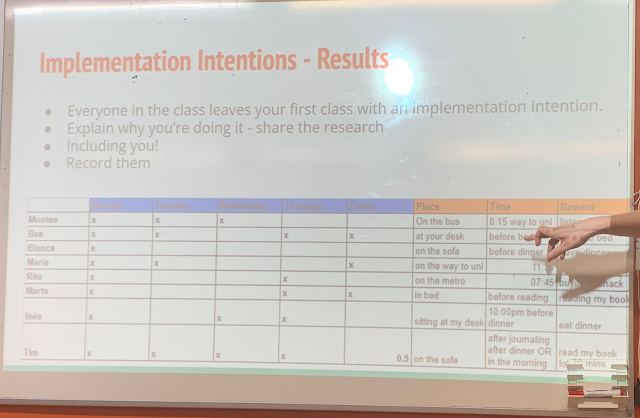Tim Warre - Atomic Classroom Habits
Innovate ELT 2023
Oxford TEFL, 20-21 May, 2023
Tim Warre - Atomic Classroom Habits
Tim’s session at Innovate ELT 2023 was
based on the book ‘Atomic Habits: Tiny Changes, Remarkable Results’ by James
Clear (2018) and observations of the habits of some of his more successful students.
First of all, a clarification. I’d initially
interpreted the ‘atomic’ in the title of the talk as a negative adjective: a
habit to be eliminated, but in fact – as is clear in the title of the book – atomic actually
refers to ‘tiny’: small changes that are doable and manageable. Clear calls
this the ‘aggregation of marginal gains’, which ultimately lead to growth and
development: an altogether more positive message!
The
Four Laws of Behaviour Change
Tim introduced us to four rules that will facilitate
the adoption of positive habits:
1. Make it obvious
2. Make it attractive
3. Make it easy
4. Make it satisfying
He then went on to give examples of how he had applied these rules in his own daily life. He wanted to increase the amount of time he spent reading, so....
Make it obvious – place a book on your pillow every morning.
Make it attractive – use ‘temptation bundling’ strategies, e.g. after you’ve read three pages, you get to check twitter.
Make it easy – the book is right there, close to hand.
Make it satisfying – use a habit tracking app to track your streaks. Set a yearly goal on Goodreads
In the next stage of the workshop, Tim suggested some strategies for applying some of these rules with
your students, This was a packed session, so I'm only sharing a small sample here.
Implementation
intentions
Set ‘implementation intentions’ on the
first day of class. Students state what habit they hope to adopt and add when
and where to make it realistic. The teacher gives themself as an example.
This kind of activity takes advantage of
students’ initial enthusiasm. I’ve done a similar activity with a ‘Student
Contract’ for years. The challenge is to maintain that energy, so Tim followed
up with suggestions about how to make the changes sustainable.
Retrieval
Practice
Integrate plenty of opportunities for ‘Retrieval
Practice’ into your classes – spaced repetition to help learners retrieve information
from long-term memory. Here Tim recommended some ideas from the book ‘Retrieval
Practice’ by Kate Jones, a History teacher working in mainstream education.
Some examples include ‘retrieval placemats’ and ‘retrieval grids’ which can be
seen in the images below:
Use the first 5 minutes of class to choose
a topic from the grid and ‘brain dump’ what they remember in pairs. Then check
their notes and add further information (in a different colour). In the next
class, choose a different square from the grid.
Tim suggests putting ideas for retrieval practice
on cards (e.g. four ways of disagreeing politely) together with the dates these
were introduced in class. Students get extra points for remembering things from
further in the past.
Habit
Tracking
Using Habit tracking apps can make progress
more satisfying. Apps such as Habitica gamify your progress. You can even set group challenges and win weapons and
power points to defeat the app ‘bosses’ (feral dust bunnies was a particular
favourite!).
The session was packed with practical and
useable classroom activities. Consult Tim’s blog for further ideas,
For anyone interested in following up with what research has to say about the habits and strategies used by successful language learners, I’d recommend Griffiths, C. (Ed.) (2009) Lessons from Good Language Learners, CUP.
You can also watch James Clear talking about Atomic Habits here










Comments
Post a Comment